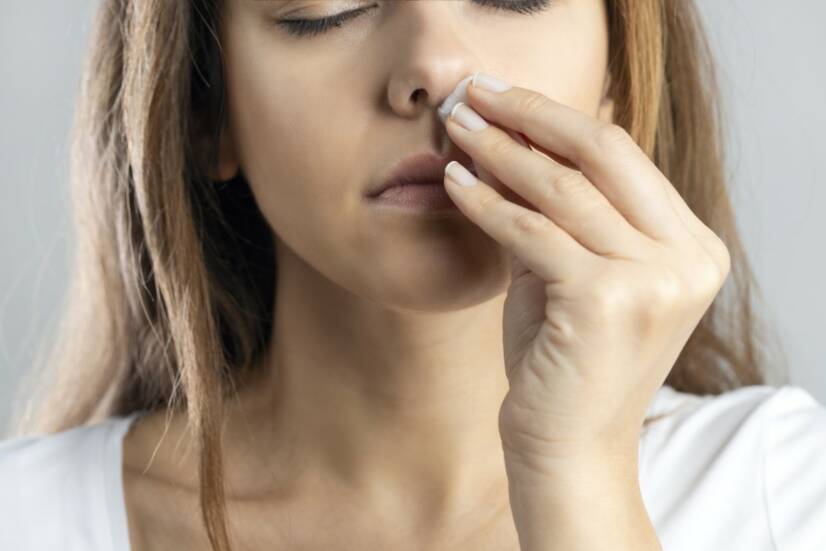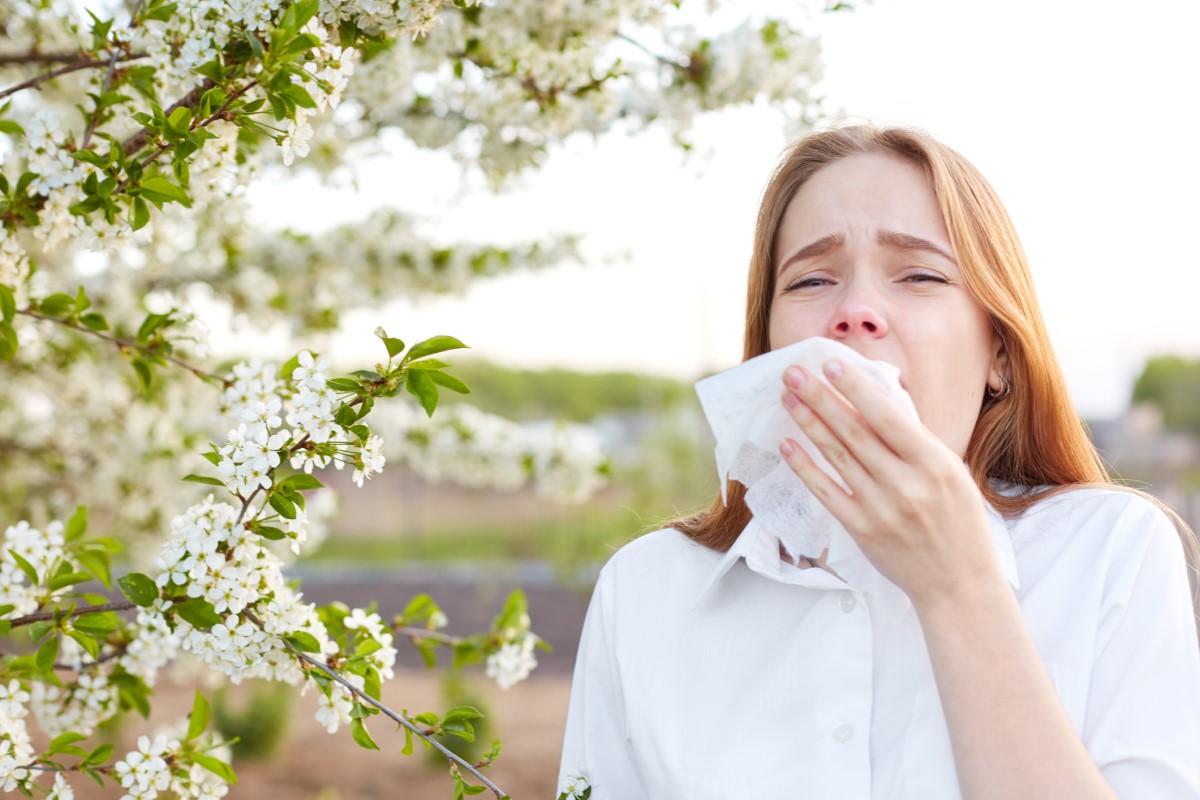- Bleeding: Penka Miroslav, Penka Igor, Gumulec Jaromír, a kolektiv
- gami-med.sk - Nosebleeds
- clevelandclinic.org - Nosebleed (Epistaxis)
- nhs.uk - Nosebleed
- enthealth.org - Nosebleeds
- healthline.com - What Causes Nosebleeds and How to Treat Them
Nosebleed: Is it a symptom of a serious disease? Common in children and adults

A nosebleed is a scary sight for many people, coupled with concerns about their own health. The good news, however, is that most of the time, nosebleeds are not a serious problem.
Bleeding from the nose, from its arteries or veins, arising without cause is called spontaneous or idiopathic epistaxis.
It affects people of all ages, but most commonly children and men over 50.
The most susceptible people to the occurrence of hemorrhage are:
- Young children, who usually outgrow the symptom of nosebleeds by the age of 11
- Older people, whose nasal mucosa tends to be more dry and whose veins are weaker and more prone to damage
- Pregnant women. During pregnancy, the nasal mucosa is more blood-constricted, which can cause nosebleeds
The nasal mucosa is richly vascularised with fine capillaries (hair cells), veins and blood vessels. The nasal mucosa is prone to bleeding even with minor irritation.
Functions of the nasal cavity:
- Preheats inhaled air
- Purifies inhaled air from impurities and viruses
- Humidifies the air inhaled
- On the surface of the mucous membrane there are olfactory cells that allow us to smell smells and odours
Finding out the cause of a nosebleed that occurs without an obvious cause is very important. It may be a symptom of a more serious disease.
Usually only one side of the nasal cavity bleeds, more rarely both. Bilateral bleeding can occur especially after injuries.
The cause of nosebleeds can be
It can be a local cause, when nosebleeds occur due to repeated irritation of the nasal mucosa in the anterior part of the nasal septum.
Bleeding occurs from superficially located blood vessels in the mucosa.
Local causes can be improper cleaning of the nose, nose picking, especially in children, foreign bodies in the nose, as well as a deviated nasal septum, chronic rhinitis and nasal tumours.
It can also be the result of cardiovascular diseases, high blood pressure, viral illness, fever, blood diseases(leukemia, hemophilia and other blood diseases), use of drugs of the acetyl group (acylpyrine, anopyrine), vitamin C deficiency, hormonal disorders, pregnancy and other diseases.
Nosebleeds can occur in the front or back of the nose (table)
| Bleeding | Localization | Incidence | Symptoms |
| Anterior bleeding |
|
|
|
| Posterior bleeding |
|
|
|
Symptoms accompanying nosebleeds
Just before a nosebleed, symptoms such as:
- a tickling sensation in the nose
- a dry or stinging sensation in the nostrils
Nosebleeds may be accompanied by a rapid pulse and increased blood pressure.
Other symptoms may include: general weakness, pallor, rapid pulse, which is particularly associated with fear.
Rare symptoms:
- Vomiting of blood, there may be streaks of clotted blood in the vomit.
- Black stools may appear if large quantities of blood are swallowed
- With prolonged bleeding, a feeling of fainting may occur
- With frequent nosebleeds, anaemia occurs
Bleeding may start from one nostril or both nostrils at the same time.
How long does the bleeding last?
It can last from a few seconds to several minutes.
With bleeding that does not stop within 10 minutes after nostril pressure without release with the head slightly bowed, with repeated attempts three times in a row, it is necessary to visit the emergency room.
Intensity of nosebleeds (Table)
| Normal bleeding | A normal nosebleed is one that is due to swelling or minor mucosal damage Often occurs in allergy sufferers, with frequent sneezing followed by bleeding, in children due to nose picking | Such nosebleeds tend to be weak and subside within a few minutes |
| Less severe | Minor nosebleeds are bleeding due to trauma or high blood pressure where we know the cause | Bleeding is usually slight to moderate and usually stops easily |
| Severe bleeding | Severe bleeding is mainly post-traumatic nosebleeds with subsequent fracture of the nasal bone, but also bleeding due to high blood pressure | Bleeding does not stop even after 30 minutes of trying to stop the bleeding |
| Very severe | A very serious nosebleed is considered to be a bleed in people with blood diseases, insufficient quantity or function of platelets (blood platelets), haemophilia (bleeding disorder) After head injuries, the risk of bleeding in the brain must also be considered, especially in skull fractures | In addition to nosebleeds, bleeding from the ear is also common, with possible impairment of consciousness A nosebleed arrest is severe and needs medical treatment |
You can read more about nosebleeds in our article:
Nosebleeds. What are the most common causes and how to stop it?

Nosebleeds during sleep
Nosebleeds can start during sleep.
A person wakes up because of the sensation of blood running down the throat or running from the nose.
The cause is usually drying of the nasal mucosa by dry air, but also allergies, colds, upper respiratory tract infections, or a short-term increase in blood pressure.
The reason for nosebleeds during sleep can be the position with the head to the side, which compresses the nostrils.
Bleeding is usually mild and resolves within 10 minutes.
Bleeding after blowing the nose
Frequent blowing of the nose and the pressure exerted by blowing the nose can damage the fine blood vessels. This causes a slight bleeding that is usually seen on a handkerchief containing nasal mucus.
Persistent bleeding after blowing is weak, stops quickly, and lasts only a few minutes.
Nosebleeds due to weak capillaries
Nosebleeds due to capillary fragility occur especially in young children without an obvious cause.
It can occur after picking the nose, a gentle blow to the nose or by lifting an object or bending over sharply.
In children, it's more complicated. When they play, they don't think about the fact that just the slightest blow will cause their nose to bleed.
Bleeding from a single and weakened capillary is manifested by blood flowing out of the nose in the form of a thin line.
Nose trauma, nasal injury
After an injury, damage to the mucous membrane can occur, which manifests itself in nosebleeds.
Bleeding after minor trauma is not severe and subsides in a short time.
With major head injuries, nosebleeds can recur for weeks, which may indicate a traumaticaneurysm on a blood vessel in the lining of the nose.
Bleeding may be accompanied by pain around the affected area and nausea.
Sometimes simultaneous bilateral bleeding from both nostrils occurs.
Aneurysm after trauma
An aneurysm (vascular aneurysm) in the nasal cavity that did not result from trauma is rare.
Severe, massive nosebleeds can occur with sampling or mucosal damage.
Tumors
In the case of an asymptomatic tumour, bleeding occurs repeatedly from a single nostril.
Bleeding may be slight, mild, or more rarely, severe nosebleeds of varying duration may occur.
More severe nosebleeds that recur may also be indicative of tumour spread.
Other possible common causes of nosebleeds
High blood pressure, atherosclerosis and nephrosclerosis (kidney disease) can cause bleeding from the back of the nose.
When there is a sudden short-term increase in blood pressure, it is something like a defense mechanism of the body, by which the body tries to balance the blood pressure.
The dry air dries out the lining of the nose, which leads to cracking of the mucous membrane and damage to the fine veins. As a result, bleeding occurs when sniffling or after picking the nose.
Nose picking, which is particularly common in children, causes irritation and damage to the nasal mucosa. The mucosa then bleeds. The damage is manifested by frequent, slight bleeding.
Nasal sprays and their frequent use lead to drying of the mucous membrane and bleeding.
Inflammation of the nasal mucosa can cause minor nosebleeds.
Infections are not manifested by heavy bleeding. Usually only the fine veins and veins are weakened. Bleeding is weaker in intensity and of short duration.
Bleeding in infection is caused by excessive blood supply to the mucous membrane and may also be as a result of taking higher doses of salicylate drugs (acylpyrine).
Haematological diseases are among the most serious diseases. Massive bleeding usually occurs and is difficult to stop. It usually has to be dealt with as an outpatient or by hospitalisation.
Nosebleeds in pregnancy
During pregnancy, a woman's body undergoes various changes due to increased hormone levels and increased blood volume.
The mucous membrane of the nasal cavity in pregnancy is more blooded, it may be with swelling and dryness of the mucous membrane. Thus, it is more prone to nosebleeds.
With a slight increase in pressure in the delicate nasal vessels, which are more vascularized, a weaker bleeding may start from time to time.
The most common nosebleeds during pregnancy occur in the second trimester.
Read also:
Pregnancyby weeks: How is pregnancy and fetal development?
How does the pregnancy progress?
The basis for a correct diagnosis is a detailed medical history. It is found out when the bleeding began, how long it lasts, what is its intensity. The cause is found out and whether you bleed from one or both nostrils at the same time.
Nosebleeds are examined in the ENT (ear, nose, throat) clinic.
Examinations that are carried out:
- An anterior rhinoscopy to find out where the source of the bleeding is.
- Blood sampling for coagulation factors and blood count
- Imaging methods such as X-ray, CT and MRI scans
- Complete internal examination
- Regular blood pressure measurements at home are also recommended when nosebleeds occur
How to prevent nosebleeds?
- Proper nasal hygiene
- Humidifying the air or applying drops or sprays to the nose to moisten the nasal mucosa (sea salt sprays), especially in winter
- For dry mucous membranes, ointments or nasal gels can be applied with a cotton bud
- Use the right treatment for a cold
- Sufficient vitamin C
- Do not use acylpyrine, which reduces blood clotting and leads to increased bleeding
- Avoid foods that contain increased amounts of salicylates (coffee, tea, apples, mint, apricots, grapes, peaches, plums, tomatoes, peppers, cucumbers)
- Avoid cigarette smoke, which can irritate the nasal mucosa
- Sneeze with your mouth open so that strong pressure does not build up in the nasal cavity
Read also: Do you suffer from hay fever or allergic rhinitis?
First aid, how to proceed and what to do for nosebleeds:
- Do not tilt your head
- Put a cold compress on the nose
- Press the soft parts of the nose against the septum
- Put a piece of wet cotton wool in the nose
- If none of this helps, seek professional help immediately
- The doctor will perform an anterior and, if necessary, a posterior tamponade
- If there is massive bleeding, the supply vessels must be ligated
When to seek immediate medical attention?
- If the bleeding lasts more than 20 minutes with direct pressure on the nose
- In case of heavy bleeding with a feeling of weakness and dizziness
- In case of heavy bleeding or heavy blood loss
- If there is difficulty breathing
- Bleeding due to a blow or fall
- When a foreign body is suspected in the nose
- Blood in vomit and black stools
Read also:
When is black stool normal and when to see a doctor? Blood in stool
When to see a doctor?
- If you have frequent nosebleeds, repeated nosebleeds at least 1 time a week
- When feeling weak, faint, tired, pale skin which could indicate anemia
- Nosebleeds in children under 2 years of age
- When taking blood thinners
- If the bleeding may be related to the use of newly prescribed medication
- Bleeding, increased bruising, bloody urine
- Family history of bleeding, haemophilia
- Uncertainty about the severity of the condition
What to avoid after stopping nosebleeds
Avoid for 24 hours:
- Try not to blow your nose, if necessary blow only gently without strong pressure
- Do not pick anything from your nose, such as scabs
- Do not drink hot drinks
- Do not drink alcohol
- Do not lift heavy objects
- Avoid strenuous exercise
Diseases with symptom "Nosebleeds"
Interesting resources










